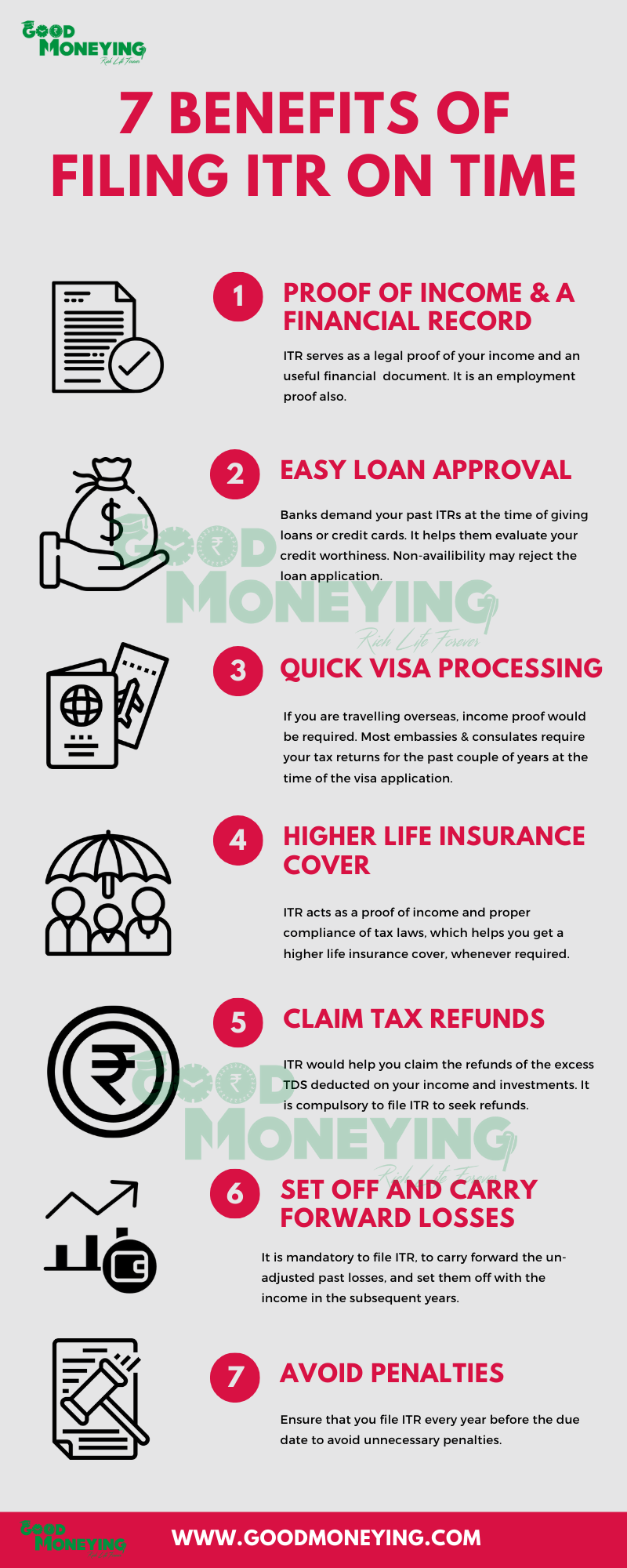If you are among those who feel that, if the bank has deducted TDS on your bank deposits and also the employer has deducted taxes from your salary, you need not file ITR, or You can file the Income-tax return at ease since all the taxes have already been paid, then this article is for you.
(Also Read: 20 Money Mistakes you should avoid making)
The income tax Act has specified certain situations when it is mandatory to file ITR. In fact, besides the mandatory requirement, filing ITR on time has many benefits as well and non-filing may attract penalties and interest on taxes, if unpaid. In extreme cases of tax evasion, it may lead to scrutiny from the Income Tax Department too.
Normally, the last date of Filing ITR is 31st July of the relevant Assessment Year, for individuals and HUF and 30th September of the relevant AY for corporates.
In case you miss this due date, you can file the Income Tax Return for FY 2021-22 (AY 2022-23) up to 31st December 2022 with a late fee, if not extended further by the income tax department. But it would not be a wise decision to wait until the last minute or delay filing your ITR without any genuine reasoning or hardships behind it.
When is IncomeTax Return Filing mandatory?
As per Income Tax rules, it is mandatory for you to file an Income Tax Return, if your gross total income (before adjusting deductions under sections 80C to 80U) exceeds the basic threshold limit i.e. Rs 2.50 lakh for individuals, Rs 3 lakh for Senior Citizen and Rs 5 lakh for Super Senior Citizen. This is Required even if the tax liability is NIL.
He/she would be required to fill and submit some specified forms, to specified banks which will calculate the tax liability (after adjusting Chapter VI A Deductions, and rebate u/s 87A) and deduct TDS.
(Also Read: Old or New Tax Slabs, which one to choose?)
Apart from this, ITR Filing is also compulsory in the following circumstances:
- To claim any income tax refund- i.e. when your TDS deducted under different Income sources is higher than what you are actually supposed to pay. (Also Read: Taxation of Mutual Funds in India)
- To set off and carry forward any loss of the previous years- Yes, if you have booked some capital losses in a year that could not be set off with any taxable gain in the same year, then that can be carried forward and set off with the future taxable gains. (Read: How to set off and Carry Forward Losses)
- If any resident individual has a financial interest in any foreign assets i.e. assets located outside India or is a signing authority in a foreign bank account. (Also Read: What is RNOR Status and how to determine Residency of an Individual)
In Budget 2019 few more criteria were inserted for compulsory ITR Filing:
- If your electricity bill in any year exceeds Rs.1 lakh
- If you have spent Rs. 2 lakh or more on a foreign vacation, on self or others.
- If you have deposited an amount or aggregate of the amounts exceeding Rs 1 crore in one or more current accounts.
Benefits of filing Income Tax Return on time (i.e. before the due date):
The below infographic lists the benefits of ITR filing on time:

What happens, if IncomeTax Return Filing is delayed or missed?
If the return is filed after the due date, it is called a belated return. You can file a belated return only till the end of the assessment year, i.e. up to 31st March of the next year.
In Budget 2021, it was reduced by 3 months i.e. up to 31st December of the next year.
For e.g., the last date to file an IT return for FY 2021-22 (AY 2022-23) would be 31st July 2022. However, you would be allowed to file ITR even after that but only till 31st December 2022, after paying the penalties and interest on the unpaid taxes, if any.
a) If you owe zero tax:
If you are unable to file your Income Tax Return before the due date, it can be filed later but with a penalty of Rs.5,000. However, if your income is below Rs.5 lakhs, then the maximum penalty would be Rs.1,000. This rule is applicable from FY 2019-20 (AY 2020-21).
Earlier, the maximum penalty was Rs. 10,000. Up to 31st December, the penalty was Rs. 5,000 and after that, it is Rs. 10,000.
b) If you owe tax as well:
If there are unpaid taxes as well, along with the penalty mentioned above additional 1% simple interest per month (section 234A of the Income Tax Act) from the due date till the return filing date, will be charged.
So, for example, if you have an outstanding tax payable of Rs.10,000 and filed your tax return, 3 months after the due date, you will have to pay an interest penalty of 3% (1% per month x 3 months) on the balance tax amount of Rs. 10,000, i.e. Rs. 300, along with the penalty of Rs. 5,000.
IncomeTax Return Filing- Final Words:
As a responsible citizen of the country, It is the duty of every earning individual to file an income tax return.
Although not mandatory, if your income is below the exemption limit, but it is advisable to file ITR, every year before the due date even if your income falls below the minimum exemption limit, or you have already paid your taxes due.
(Also Read: 21 Good Money Habits for a Great Financial Life!)
It would not only help avoid penalties but you can also reap various benefits as discussed in the infographics.
Have any Questions? Feel Free to ask in the comments section below.
Also check: Which ITR form you should use to file your Income-tax return?







 Manikaran Singal is the founder and Chief financial planner at Good Moneying Financial Solutions. He is a CERTIFIED FINANCIAL PLANNER CM and SEBI registered Investment adviser (Regd no. INA 100001620). He’s having 20+ years of experience in financial services space.
Manikaran Singal is the founder and Chief financial planner at Good Moneying Financial Solutions. He is a CERTIFIED FINANCIAL PLANNER CM and SEBI registered Investment adviser (Regd no. INA 100001620). He’s having 20+ years of experience in financial services space.


My wife has an interest income from Fixed deposit amounting to Rs 52000. Previously Bank did not ask for 15 H in case interest is below 50000. With automatic inclusion of standard deduction Rs 40000 should bank deduct TDS upto Rs90000(50000+40000) or not
Bank will not consider Standard deduction. What matters to the bank for deducting TDS is the Interest Income.